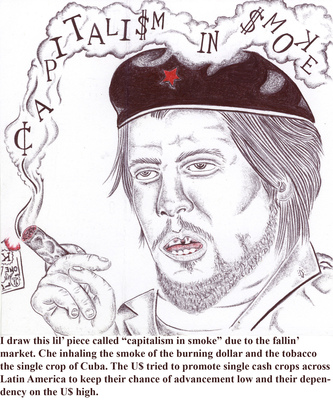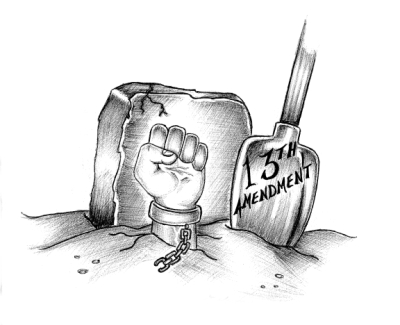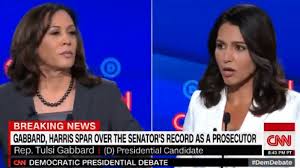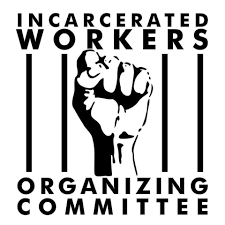
Exposing the Lone Star Chamber (of Enslavement!) Part II
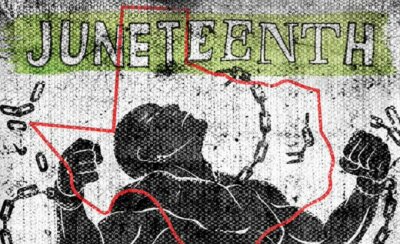
Slavery By Another Name
Texas has been overtly operating a slave trade for decades. You may be surprised to know that people still wrestle with distinguishing the difference between being incarcerated and being enslaved. This is why after the countrywide prison demonstrations of 9 September 2016, Bennu Hannibal Ra Sun of the FREE ALABAMA MOVEMENT said that he noticed a dragnet pattern after 15 to 20 interviews where they kept asking why we refer to incarceration as slavery. From that point on he required media to read the 13th Amendment before he would allow an interview.
Incarcerated, Imprisoned or Enslaved?
To be clear, incarceration is the act or process of confining someone; imprisonment. To imprison simply means to confine (a person) in prison. So far, we haven’t delved into treatment that would call for the loss of the right to vote, bear arms, live in certain communities, adopt a child or be forced to provide free labor.
Both incarceration and imprisonment utilize confinement as a form of punishment. Slavery, on the other hand, is 1) A situation in which one person has absolute power over life, fortune and liberty of another; and 2) The practice of keeping individuals in such a state of bondage or servitude.
Here, the word servitude comes into play and involuntary servitude is: The condition of one forced into labor – for pay or not – for another by coercion or imprisonment. This is where you see that the imprisonment is a means to the labor.
Under the first definition of slavery provided above was the usage of a word that most only know to refer to a human being. However, according to Black’s Law Dictionary, an entity (such as a corporation) that is recognized by law as having the rights and duties of a human being is the second definition of person.
We now know that slavery can be a scenario in which one corporation has absolute power over life, fortune and liberty of a human.
The word corporation would usually bring to mind Amazon or Walmart but those are small fish in a bigger pond. A corporation is sort of a person and a government is a sort of corporation. The city/county you are from was incorporated into your state which was incorporated into the UNITED STATES OF AMERICA through its Articles Of Incorporation. This is why the corporation, which is the U.S. of A. has an office for the president, vice president, secretaries and staff members etc., who are members of the EXECUTIVE branch of our governments which are corporations that have absolute power over life, fortune and liberty of others via their institutions of slavery.
Felons Are The New Niggers
As the author and educator Claud Anderson, Ed. D. stated on page 66 of his book Black Labor, White Wealth:
“Black enslavement must be a constant reminder of the ramifications of a lack of collective unity, strength and self-determination.
It is incumbent that you come to discern that those who are economically challenged are subjected to prosecutions at a far higher rate than the upper class, imperative for us to acknowledge that though those subjects are predominantly Black, as a class, they are multi-ethnic and as such, convicted felons of all backgrounds have become the new Blacks; ones relegated to niggerdom.
For example, in Texas in the year 2000, Latinos were nearly twice as likely as whites to be incarcerated,(1) but shocking is the fact that in 2002 Latinos were a larger portion of new prison arrivals than either Blacks or whites (33.9% Latinos, 32.8% Blacks, 32.2% whites)(2) yet sadly, a smaller portion of the releases. They were going in at a higher rate but coming out at a lower one.
These numbers for Latinos are alarming in light of how bad Blacks were treated during the period from 1986 to 2000 where spending only increased 47% for Texas Higher Education but a whopping 346% for Texas Corrections.(3) This maneuver caused Blacks to be sent to prison 7 times more than whites for drug offenses, making Blacks 81% of the whole state’s prison growth for drugs.(4)
Additionally, the number of Black youth imprisoned for drugs during roughly the same period rose by 360%, however, for young whites imprisonment for drug offenses declined by 9%.(5) With that knowledge it becomes apparent that the 360% increase in Black bodies was the Return On Investment for the 346% accretion in correctional spending.
The result was that in 2003, Black Texans were incarcerated 5 times as much as whites.(6) Texas had managed to have 66,300 Black males in prison and only 40,800 in the Texas Higher Education system.(7) This, regardless of the fact that in 2002 whites and Blacks, according to the Substance Abuse and Mental Health Services Administration, reported to be dependent on a substance at similar rates. (9.5% of Blacks and 9.3% of whites).
I say that this is a result because the increase in Black bodies to the plantations ensured a decrease in their eligibility to become any part of the legislature that makes laws or police officers, prosecutors, grand jurors, trial jurors, parole or probation officers, judges or justices.
On the flipside of that, and just as significant, is that if the Black man and the law collide, the institution has created a system to where as he interacts within the criminal justice machination there is a lesser likelihood that the police he may come into contact with is Black. Or the prosecutor who decides to charge him or the grand juror who decides to indict him or the judge who calls the shots in the courtroom or the trial jurors who convict him or the appellate justices or the parole/probation officers; the last three who are in the business of ”keeping individuals in a state of bondage or servitude”.
We went from being either a free (white) or enslaved (Black) man in the slave era to being either an upstanding citizen or a convicted felon, ethnicity be damned. The poor white and Latino populations, who are more likely to be convicted than their upper-to-middle-classes, are subjected to the same societal pitfalls and social stratification.
Niggerdom.
This is what Claud Anderson meant in his warning about not forgetting about the lack of unity and strength during Black enslavement, if we don’t bind together to stop this institution, the system will chain us together to feed it.
Monopoly Money (All Around The Board)
For all the prison stockyards that overpopulated Texas in the 1990’s there were mainly two styles: a maximum security template that holds three to four thousand prisoners and a medium security template that holds around two thousand. So, whereas these prisoners couldn’t vote, they became a part of the hosting county’s population, a sure gerrymandering and census incentive for when the federal government doles out X amount of dollars to districts based on population.
These prisoners are paid nothing though they produce many goods that are sold. They are paid nothing but they spend millions of their families’ dollars on commissary. There is only one place for prisoners to purchase hygiene, food, correspondence materials and a few articles of clothing, all of which are produced by prison labor, like shorts, shirts, thermals, socks and shower shoes and then sold back to them at exorbitant prices.
Prisoners who want to make a phone call are not afforded the luxury of choosing a carrier. They provide free labor and their family spends millions accepting overpriced phone calls contracted with a corporation called Securus.
These prisoners can also receive emails and funds from their families who Spend millions to send both through a company called Jpay who is owned behind the same corporate veil as Securus.
Imagine if Walmart could lock its customers in the store. To hell with a discount, they could price gouge and be certain that those suckers would fight each other to get on the phone to have their families send millions for them to buy every item in the store. They wouldn’t be able to keep anything on the shelves, no matter that most is of poor quality.
There simply isn’t a more loyal consumer base or promising commodity where the institution has created for itself a way to circumvent the free market to monopolize on the misery of the involuntary but free labor force.
We, the Texas Liberation Collective, are not lost on the fact that Texas has the expense of feeding and housing its prisoners because all slave owners have had to do the same. All livestock has to be alive to produce, be sold or traded. we are more focused on the fact that the prison population of Texas exists by design. As stated in Part One of this series, there was not a crime wave in the decade of the state’s prison boom to account for the expansion of the slave state itself.
What we endured was a bull market in the stock exchange and guess who orchestrated it? We could say that politicians and corporations were responsible but it would be saying the same thing as the two are mutually inclusive. State Senator Ted Cruz (R) works to advance the interests of the corporation he works for, it’s called Texas and its enslaved Latino population is of no concern to him.
The Texas Department of Criminal Justice (TDCJ) has a subsidiary of sorts called Texas Correctional Industries (TCI) which the Lone Star State created in 1963 during the Civil Rights era. TCI is governed by the Texas Board Of Criminal Justice (TBCJ) and has nine members who are appointed by the governor, five of whom are currently lawyers.
Based on the legislative language that created the TCI, the board is endowed with the authority to determine prisoners’ pay for their labor, though to date they have opted for NO PAY and involuntary servitude:
“The board may develop by rule and the department may administer an incentive pay scale for work program participants…Prison industries may be financed through contributions donated for this purpose by private businesses contracting with the department. The department shall apportion pay earned by a work program participant in the same manner as is required by rules adopted by the board under section 497.0581.”
If you’ve been told that some prisoners do earn wages if they work for private companies through the Prison Industry Enhancement Certification Program(PIECP) please be aware that the conversation isn’t held without an exaggerated depiction. Truthfully, in 2017 though TDCJ had over 145,000 prisoners, according to Jason Clark, TDCJ’s Chief of Staff in 2019, there were only about 80 prisoners who were allowed to partake in the PIECP, a number that was well below a waning one percent of the Texas prison population.
The TCI sweatshops are dispersed throughout 37 prison plantations and its free labor force – or free labor by force, shall we say? – manufactures a plethora of goods from wooden state signs, license plates, police utility vests and bedding, steel kitchenware, up-to-date ergonomically designed office furniture, park equipment, security fixtures, food service equipment and they also refurbish school buses and computers, grow crops and tend to over ten thousand head of cattle.
In the spirit of Texas, TCI’s total sales for fiscal year 2014 were valued at $88.9 million, FY 2017 it was $84 million. Outside of the minute headcount of laborers in the PIECP, the state makes these hundreds of millions from the blood, sweat and tears of a forced-into-labor labor force who is subjected to some form of penal castigation should they refuse to relinquish their labor upon demand.
The punishment may be a combination of the following restrictions:
No access to the phones, no access to the recreation yard, commissary restriction, cell restriction, personal property restriction, loss of good time and/or work time credit, loss of visitation privileges, loss of custody level which can result in being removed from general population and placed in 21 or 23 hour lock down housing. Receiving any of this retribution could result in being denied educational programs and most significantly, parole.
Juneteenth and Dale Wainwright
How ironic, yet not surprising, that Texas is shamelessly known as the last state to free the slaves —— a disgraceful fact that spawned the celebration called Juneteenth, its own holiday - yet they still haven’t freed the slaves, thus deeming Juneteenth and its celebrators a farce.
Texas and its misled sympathizers have no justifiable reason in acknowledging Juneteenth today in the same spirit that the slave negroes of the Frederick Doug- lass era had no justifiable reason in acknowledging Independence Day.
Here, we dare raise other ironies but how ironic is it that just as millions of slaves parted Africa from a slave port called Goree Island, many of us enslaved here after inception and diagnostics were shipped to and through a slave port called Goree Unit? But even more.sickening and insane is that just as some Africans sold their own into slavery, the TBCJ at one point was chaired by (Wait! I refuse to call this man Black, but he is definitely…) an African-American!
That’s right, you eased on down the red bricked road to peek behind the corporate veil to see who whitey was that refused to pay the slaves and when you raised the curtain there stood Dale Wainwright celebrating Juneteenth with a fat slave- raised burger. He made Texas history by becoming the first African-American elected to the Texas Supreme Court, but he will go down in history for being the Supreme House Negro of the twenty-first century.
He was managing partner in the Austin office of Bracewell & Giuliani, the firm where former NYC mayor and Trump prop-man Rudy Giuliani is a partner.
Another former member, Eric Gambrell, contributed to the campaign of and was appointed by Governor Rick Perry. He’s a corporate lawyer and partner at Akin Gump, a large lobbying and law firm whose clientele has included big dogs like Amazon, Pfizer and even the slimy privatized prison giant formally-known as Corrections Corporation of America.
Whether you make them or break them, law is big business in the Texas organizational construct and some of the biggest capitalists.are…lawyers.
In Part One of Exposing The Lone Star Chamber (Of Enslavement) we detailed how district attorneys bypass and usurp the authority of Texas grand juries to rubber-stamp what is purported to be an indictment but fails to constitutionally vest a district trial court with subject-matter jurisdiction. Thus, the lives that filled the stockyards were kidnapped under the watchful eyes of congress and company.
Here, we have hopefully assisted in helping you know slavery when you see slavery in the same way that you would know that a pig with lipstick on is still a pig.
In Part Three of this series, we will examine some intricate details of the Texas slave trade and question how in the age of Black Lives Matter, the age of Prison Lives Matter, and with all the professed social and criminal justice warriors and reformists, the Lone Star Chamber continues to broker these bodies shamelessly and unchallenged.
Until now!
MIM(Prisons) responds: We welcome comrade Ice Immortal Askari to the pages of Under Lock & Key. This well-researched piece touches on some recurring themes in our newsletter. The first is the interplay of class and nation in the U.$. prison context. As our comrade points out the disproportionate targetting of New Afrikans and Raza, as well as First Nations, by the injustice system, ey sees prisoners of all nationalities in the same boat. This is generally our line as well, we must unite the imprisoned lumpen class across boundaries. But we also must recognize the particularities of different nationalities in this country, and recognize the importances of national liberation struggles in the dismantling of U.$. imperialism.
The author defines slavery as:
“1) A situation in which one person has absolute power over life, fortune and liberty of another; and 2) The practice of keeping individuals in such a state of bondage or servitude.”
The author attempts to distinguish slavery from imprisonment. But we find this distinction not useful as the expressed purpose of imprisonment is to impose state control over the lives of individuals deemed to have committed a crime. The American Heritage Dictionary provides one definition of slavery as, “A mode of production in which slaves constitute the principal work force.” This is a simple summation of the Marxist definition. We’ve written extensively on this question of prison slavery in the past. And a new summary of our research on prison labor and economics will be available in the next edition of The Fundamental Political Line of the Maoist Internationalist Ministry of Prisons. In short, the motivation for imprisonment is not profiting off of prison labor as was the motivation for slavery in this country or any other country in the world.
The realm of prison labor is a realm where tactical action and organizing can occur. We agree that it is important to the running of these institutions and as such can be used as a means of exerting political pressure.
Telling people they must cook or clean to help maintain the facility they are living in is not an injustice. Having people do productive labor as part of the punishment for a crime against the people is not an injustice. The injustice is who is being put in prison, and for what reasons, and how they are being treated in there.
Amerikans oppose prison labor for the same reason they oppose migration, they don’t want to dilute their inflated wages. So we caution those in the prison movement who try to unite with the labor aristocracy on this issue, when they have consistently stood with the cops and the prison unions throughout history. As we unite along common class interests in prison, we must recognize that our support base on the streets is in the national liberation struggles of the oppressed.
Notes:
1. Coyle, Michael J. Latinos and_the Texas
Criminal Justice System: NCLR Research Brief. (2003) Washington, D.C. :
National Council of La Raza
2. Findings Of The National Council Of
La Raza – (NCLR) 2003: Racial And Ethnic Minorities Over-represented in
the Criminal Justice System
3. Cellblocks or Classrooms, The Justice
Policy Institute (2002)
4. Findings Of The Justice Policy Institute
– Analysis of the National Corrections Reporting Program on Race and
Drug Admissions in Texas (2003)
5. Findings of the Steward Research
Groups – Commissioned by the NAACP Texas State Conference and NAACP
voter Fund
6. Findings of the Justice Policy Institute – Analysis of
the National Corrections Reporting Program on Race and Drug Admissions
in Texas.
7. ibid








